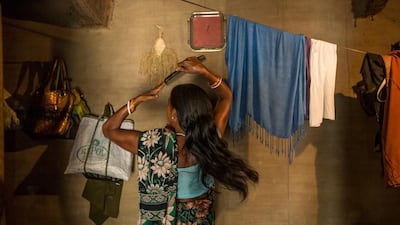Matilde Gattoni, whose work will soon go on display in Dubai, documents social injustices that ruin lives.
“I’ve noticed that life tends to be more difficult for women across the world,” reflects French-Italian photographer, Matilde Gattoni whose work has taken her across four continents.
“Even if you are from Italy, for example, of course it’s much easier than Bangladesh, but you always have to work harder in order for people to recognise that you can be capable of doing something good; that you are capable of doing important things.”
Gattoni has spent the last 15 years documenting war and drought, natural and man-made disasters. Her career as a photojournalist began in Palestine in 2000, when she covered the start of the Second Intifada, and in the years since, her work has appeared an array of newspapers and magazines including Time, The Observer, The New Yorker and Vanity Fair, as well as The Review. This month, she will be showing a series of striking portraits of some of the women she has met on assignment, at an exhibition entitled HER, at Gulf Photo Plus, in Dubai's Alserkal Avenue area.
Why women? “I’ve noticed that women are usually more resilient; they’re more positive; they’re more willing to risk everything and to work harder in order to find, say, shelter for their kids,” she says of her connection to her subjects.
One woman who was particularly inspiring was Mai Khang, a 30-year-old Laotian mother of four, who Gattoni met six months ago.
“I went there to do a story on the anniversary of the Vietnam War. Laos is actually the most bombarded country in the world – in a secret war that lasted for nine years, during the Vietnam War.”
It was there that she met Khang, a widow whose husband committed suicide after losing his sight while chopping down a tree containing a hidden cluster bomb. “In that part of the world, when a man or a woman loses sight, or an arm, or are handicapped, they are considered useless,” Gattoni says, “because they cannot earn money anymore and it’s too difficult to feed and take care of them.”
After the accident, Khang’s husband fell into deep depression. “When it happens to a woman … the husband will often leave her with the kids and find another woman somewhere else. Women don’t usually do that.
“Before he committed suicide, she told him that no matter what, she was very much still in love with him and would support him. She told him not to commit suicide. I was very impressed by this story because a mother who ends up supporting her handicapped husband and four kids – the only breadwinner of the family, working in the rice fields – I mean, it’s a hard life.” And yet, Gattoni says, Khang still had a “very tender smile and look in her eyes”.
“Even if it is supposed to be the man who is stronger, I think, in these moments, the women come out as stronger.”
Other portraits in the exhibition was taken when Gattoni visited Jharkhand, one of the poorest states in India, where single women are sometimes accused of being witches.
“Actually, they’re not witches at all – they don’t do anything in order to be accused of witchcraft. It’s usually about land, because, especially in that region of India, women are extremely vulnerable when they are single. Their neighbours try to steal their land, so they accuse them of being witches, and the whole community turns against them and they end up being killed in a terrible way.”
Living and working in Dubai and Lebanon for the past seven years, has given the photographer an insight into the way professional women are treated both here and at home.
“From a working point of view, you actually have more opportunities as a woman in Dubai than you have in Italy,” she says. “I’m from Milan … [and] a woman who does exactly the same job as a man earns 50 per cent less in Milan.”
Here, she says, she has never felt she had to fight harder because she was a woman, or that clients would not feel comfortable working with a woman.
The photographer believes society tends to make women feel they are not capable of doing the same things as men. “I think that change can come from education; from the family; from giving the same responsibilities to boys and girls; from treating them the same way.”
HER is being shown at Gulf Photo Plus, Alserkal Avenue, Dubai, from September 14 to October 31.

